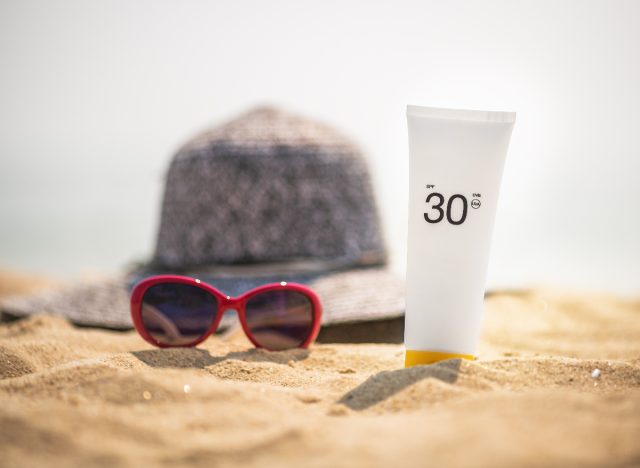The Worst Skincare Mistakes That Make You Look Older, Say Experts

Fact: We really care about our appearance. One recent survey of 2,000 Americans put together by Massage Envy found that 67% of all adults habitually wrestle with self-confidence issues directly related to the appearance of their skin. Roughly half of those (46%) admitted that they’ve struggled with skin-related worries since childhood, while 81% of that subgroup said they continue to deal with those same reservations today. What’s more, more than half of the survey’s respondents said that they’ve left work early—or called in “sick”—over anxieties related to their skin.
Now, even if you don’t actively worry about the state of your skin, chances are you still want it to look as good as and healthy possible (who doesn’t?!). This is why it’s hugely important to avoid several crucial no-nos when it comes to skincare, as many of them can actually backfire, age your skin, and even make you appear older.
“There are so many little skincare mistakes that can take a toll on the appearance of our skin,” says Alexia Wambua, veteran esthetician and founder of Native Atlas. “One that immediately comes to mind is going to bed with your makeup on. It’s imperative that you wash your face before going to bed (even if you aren’t wearing makeup!) to get rid of all of the pollutants you’re exposed to daily. If you don’t take the extra time to do this, your skin will show signs of damage and age at a faster rate.”
So consider that your first mistake. What are the others that will leave you looking older than you should? Keep reading to find out. And for more hygiene tips you should know, don’t miss the Small Daily Habits That Are Way Worse for You Than You Thought.
You’re Washing With Super-Hot Water

“If you wash your face with water that is too hot, you could be drying out your skin,” explains Guna Kakulapati, CEO of CureSkin. “Frankly, any skincare mistake that leads to over-drying your skin such as skipping moisturizer (even if you have oily skin), using harsh cleansers, or exfoliating every day can cause you to look prematurely older. This is because dry skin reveals fine lines and wrinkles more readily than hydrated skin. Dry skin doesn’t cause fine lines, but hydrated skin is plumper and can conceal fine lines more easily.”
According to the American Academy of Dermatology, moderately warm (lukewarm) water is the best temperature for putting together the ideal face washing routine. For more hygiene tips, make sure you avoid The Single Worst Time of Day for Taking a Shower, Says Science.
You’re Not Exfoliating

“Exfoliating” is merely a fancy way of referring to the removal of any leftover dead skin cells lingering around your pores. Human skin automatically sheds dead skin to make room for new cells roughly every month, but sometimes a few dead cells are determined to stick around. When this happens, it results in patches of dry skin and clogged pores.
Luckily, adopting a regular exfoliation regimen—but no overdoing it—can reduce acne, leave skin looking brighter, and increase the effectiveness of various skincare products in the short-term. Over a longer period, regularly exfoliating will increase collagen production, which is key to keeping skin looking young and minimizing wrinkles and sagging, according to the health experts at Cedars-Sinai Medical.
“Use a physical, chemical, or enzyme-exfoliating product to slough off dead skin cells,” says Ashley Holladay, Senior Editor at Skincare Lab. “Without proper exfoliation 2-3 times per week, the skin can appear dull and uneven. Unleash a smoother and brighter complexion with a gentle exfoliant. Just remember to not overdo it.”
You’re Running Too Much

We love running, it’s incredibly beneficial to your health in almost too many ways to count, and we’d urge you to run as far and as often as your body will comfortably allow it. But while a daily run is great for your heart, some health experts believe that the combination of sun exposure and vigorous activity can prematurely age your face. “I recommend brisk walking in lieu of running, as it provides great cardio benefits without the facial jarring (and sagging!) that occurs with running,” says Tina Alster, MD, FAAD.
Though many disagree with the connection between running and your face, you should always take special care to wear the proper SPF sunscreen when you take to the pavement. (More on that later.)
You Care About Your Tan

Millions spend every summer in pursuit of the perfect tan, but at what cost? “If you’re trying to maintain youthful, beautiful, wrinkle-free skin, sunscreen should be your lifeline,” says Kathryn McDavid, CEO of Editor’s Pick. “In every skincare routine it should be your first priority, but too many make the mistake of choosing a tan over an aged face. The UV damage from the sun’s rays generally takes many years to truly take a toll on your skin, but the first signs can often appear much sooner, and many young people who sunbathe and don’t wear sunscreen look older than they are.”
A minor wardrobe change as simple as bringing a sun hat with you to the beach can make all the difference in terms of avoiding UV-ray related rapid skin aging. Most dermatologists recommend using a lightweight or moisturizing sunscreen every day, regardless of whether you’re going to be lounging in the sun or not.
You Use Sunscreen, But the Wrong SPF

One of the most common questions when it comes to skincare is which SPF variety to use. According to The Skin Cancer Foundation, there are two forms of UV rays: UVA and UVB. The latter “cause sunburn and play a key role in developing skin cancer. A sunscreen’s SPF number refers mainly to the amount of UVB protection it provides.”
Meanwhile, UVA rays “cause skin damage that leads to tanning as well as skin aging and wrinkles.”
Steven Q. Wang, MD, of the Memorial Sloan Kettering Cancer Center, stresses that it is “important to look for the words ‘broad spectrum’ on a sunscreen’s label, which means it has ingredients that can protect you from UVA as well as UVB rays.”
In most cases, an SPF 30 sunscreen offering broad spectrum protection should be enough to protect your skin. If you have a history or high genetic risk of skin cancer, you may want to opt for SPF 50 just to be safe.
You’re Waiting Too Late to Change Your Ways

If you’re neglecting your skin just because no wrinkles or obvious signs of aging have appeared yet, you’re not doing yourself any favors. “The biggest mistake women make is they start taking care of themselves when signs of aging become visible,” says Amna Khan, MD of Your Doctors Online. “At that point, it is very hard or even impossible to reverse the signs of aging using common over-the-counter creams. However, it is a lot easier to prevent wrinkles if you start a proper skincare regime at around 23 to 25 years of age.” And for more ways to improve your appearance, don’t miss these Secret Exercise Tricks for Getting Rid of Wrinkles, Says Science.








